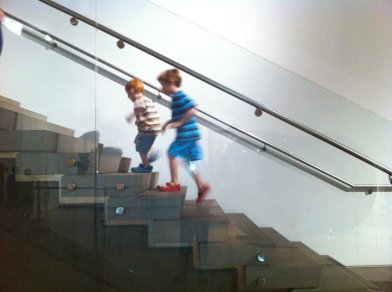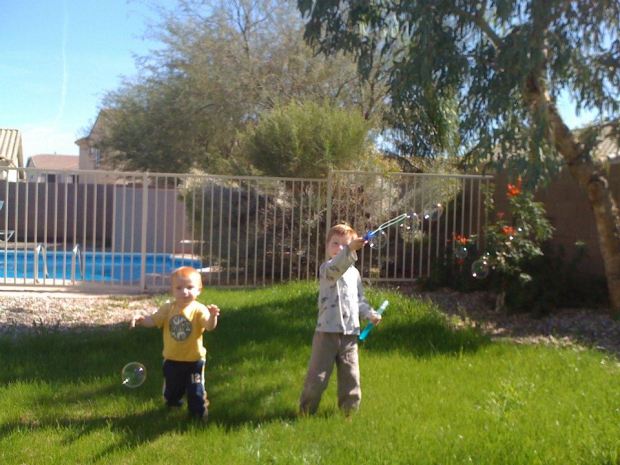The scene plays out a million times. Parents, the developmental pediatrician, the child who is not hitting social milestones. The tears. I’ve been there.

The advice. Medications. Therapies, Visits, Appointments. One breeding another like Mickey in the Sorcerer’s Apprentice, ceaseless brooms and buckets. They want to help but they exist in a clinical setting and who plays in an exam room or a designated therapeutic space? By definition play is organic, unbounded and engaging.  Directed play with a counselor moving towards a play objective is not play. It is an intervention. I don’t care how the room is dressed up with balls, color and swings.
Directed play with a counselor moving towards a play objective is not play. It is an intervention. I don’t care how the room is dressed up with balls, color and swings.

I had memories stir inside me, I related. I rejected my fear about the word autism and reached back into my past for tools that I could use to socially advance my child without making him feel less than.
If you require therapeutic language, call it “immersive home based play therapy”, in my words “a 70’s childhood.” Every parent draws from personal experience–and mine was the backyards of my  neighborhood and staying outside in all weather. My successful experiences relied on the outdoors, a pet, cousins, siblings, sensory engagement.
neighborhood and staying outside in all weather. My successful experiences relied on the outdoors, a pet, cousins, siblings, sensory engagement.
Sensory wonder like the clattering of a train on a long Amtrak trip to Florida, pressing my face against a cold window. Splashing in water or the smell of a barn. I didn’t have a barn. I only rode a train twice. I had significant social delays, these delays existed as an acknowledgment by the adults in my life but they didn’t talk about it to me and they didn’t treat it directly with a doctor. My parents despaired of it and lived with it.  The only thing they could do in the 70’s was hope I grew out of it. This was not an amazing attitude and “growing out of it” took place to a degree but what really helped me was seeing my own child and giving words to what challenged him and what strengthened him. Because he was the same as I was. We were both on the spectrum. I made more social strides parenting him than I ever did before I knew what neurodiversity was.
The only thing they could do in the 70’s was hope I grew out of it. This was not an amazing attitude and “growing out of it” took place to a degree but what really helped me was seeing my own child and giving words to what challenged him and what strengthened him. Because he was the same as I was. We were both on the spectrum. I made more social strides parenting him than I ever did before I knew what neurodiversity was.
Every trait has a flip side to it. If a child has a strong negative behavior, flip it around and look for the strength. My social weakness enabled a hunger for sensory play. I

after the monsoon
soaked up smells and sounds. The pleasure that sensory play gave me was the foundation for my ease and slow progress. Richard Louv writes about “fascination” a suspended moment of sense engagement. If you ever laid in the damp grass on a sunny day and looked at the world from grass level, felt it tickling you, that’s fasci nation. Watch ants wending along a sidewalk towards a crumb or rolled over, shielding your eyes and following the flight of a bird, that is fascination. It has no real point and involves losing track of time and just being.
nation. Watch ants wending along a sidewalk towards a crumb or rolled over, shielding your eyes and following the flight of a bird, that is fascination. It has no real point and involves losing track of time and just being.
Fascination is fabulous. Kids are naturals at giving into fascination. Most adult put a stop to it, insisting on staying out of the dirt, getting up, get going, stop it.  These same adults will wrap back around and try to find that gift again. Maybe they forest bathe. Maybe they will Instagram a flower or a view. It is work to shut your adult brain off and just be. It’s even more work if you weren’t allowed a chance to do it in the first place. Kids can do it, but the social world demands that you direct your energy towards a goal. And that’s my problem with directed interventions and play therapy. It’s so dry. It kind of sucks.
These same adults will wrap back around and try to find that gift again. Maybe they forest bathe. Maybe they will Instagram a flower or a view. It is work to shut your adult brain off and just be. It’s even more work if you weren’t allowed a chance to do it in the first place. Kids can do it, but the social world demands that you direct your energy towards a goal. And that’s my problem with directed interventions and play therapy. It’s so dry. It kind of sucks.
The kids that hang onto fascination the longest are the country kids. The farm kids. Think of an adult that grew up playing outside. Did that person ever say “I wish I had spent more times indoors doing activities. My time outside was a waste?” I am talking to you if you are a parent that has a reoccurring appointment with a developmental therapist. I gave that world a hard pass. I walked into those spaces every few years and I always thought “This place is a bummer” I’m not giving my son over to this scene and dragging him out of the house to hang out with these well meaning, educated neurotypical people with their milestones and objectives.
 I didn’t have a farm, I was advantaged at tapping into the sensory world but my parents and teachers didn’t have language to value that. It didn’t mean anything actionable. The payoff was years down the road or simply something that gave me energy to make it through the day. The way I got the energy was invisible to everyone, even me. I didn’t know that walking the block delivering newspapers alone or riding my bike was filling me up. I just know I liked the smell of the newspaper, the sound of the wind when I pedaled. The sensory world has value and delight. It wasn’t a disaster to fail to fit in–it was just a part of my life. My life included social fails and sense triumphs.
I didn’t have a farm, I was advantaged at tapping into the sensory world but my parents and teachers didn’t have language to value that. It didn’t mean anything actionable. The payoff was years down the road or simply something that gave me energy to make it through the day. The way I got the energy was invisible to everyone, even me. I didn’t know that walking the block delivering newspapers alone or riding my bike was filling me up. I just know I liked the smell of the newspaper, the sound of the wind when I pedaled. The sensory world has value and delight. It wasn’t a disaster to fail to fit in–it was just a part of my life. My life included social fails and sense triumphs.
Most times I did not meet the standard of average behavior with people. I had meltdowns and was contrary. I didn’t have a solid group of friends. For the bulk of my life, my friends were short term. Once a person got to know me, the relationship faded away or I was immediately rejected. That’s kind of how it is if you are on the spectrum and out in the world. Even with this, I played. I was allowed to play, it wasn’t taken from me and replaced with confined society and directed activities.

this cloud looks like a bunny
and competent. I took my block of development and turned it around. What worked for me, what got me to where I am today, with a family, with friends, with a job I like and society that suits me personally and doesn’t fall outside of a social norm. I have an independent life and when I write about being on the spectrum that isn’t a label I walk around with the way my son was labeled in grade school and walked around with it every day. Having these insights compressed our timeline for development. We made big strides and we did it by throwing in challenging experiences only after loads of sensory inputs. He drank from the well of play and took on things that defeated him on a play less day.

tasting honeysuckle
recommend more doctors, interventions and in some cases medication. Meeting the doctor was always time spent doing things that stressed my son out. Traveling for an unappetizing appointment, waiting, an unappealing exam room and for a brief conversation with someone that did not know my child in any setting outside of that office. The value of a doctor is that they see a range of children like mine. This viewpoint did not offset the agitation and stress of setting aside a block time for this interaction.
 We relied on his school for the experienced voice about what they were seeing and what we could do to get us to a place where our son felt safe, accepted and competent outside the home.
We relied on his school for the experienced voice about what they were seeing and what we could do to get us to a place where our son felt safe, accepted and competent outside the home. The word “average” is undervalued and stigmatized to a degree. When I used the word “average” to describe my child, peers and family members would cringe and interject, ‘he’s not average’ Let me be clear, it is not an advantage to be treated as exceptional. Exceptionality breeds temper and a sense of entitlement. In our family, exceptionality is not a pathway to fulfillment because to get it, it requires social accommodation. Reliable social accommodation is found in small circles. Your little corner of the world. Stray outside that boundary and people are insufferable to someone that lacks the ability to adapt, strategize. Society demands that you cope with discomfort, change, indifference.
The word “average” is undervalued and stigmatized to a degree. When I used the word “average” to describe my child, peers and family members would cringe and interject, ‘he’s not average’ Let me be clear, it is not an advantage to be treated as exceptional. Exceptionality breeds temper and a sense of entitlement. In our family, exceptionality is not a pathway to fulfillment because to get it, it requires social accommodation. Reliable social accommodation is found in small circles. Your little corner of the world. Stray outside that boundary and people are insufferable to someone that lacks the ability to adapt, strategize. Society demands that you cope with discomfort, change, indifference. Childhood is precious, a rare time and all too fleeting. Childhood is your chance to fill your little person’s tank with joy, fascination, sensory play and the tools to socially advance. Play is everything. Fight against the forces that take your child away from being a child and doing what children do best, in the place they do it best in.
Childhood is precious, a rare time and all too fleeting. Childhood is your chance to fill your little person’s tank with joy, fascination, sensory play and the tools to socially advance. Play is everything. Fight against the forces that take your child away from being a child and doing what children do best, in the place they do it best in.






























